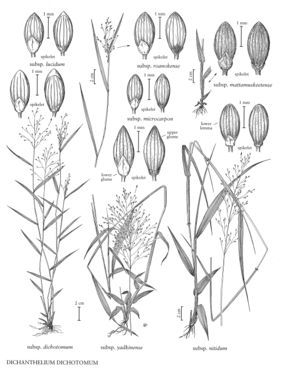Dichanthelium dichotomum subsp. roanokense
Culms to 100 cm, erect; nodes usually glabrous; internodes terete, usually glabrous, often slightly glaucous, sometimes olivaceous; fall phase with erect or decumbent culms, branching at the mid- and upper culm nodes, with numerous axillary branches, branches elongated and widely divergent, not forming fascicles. Cauline sheaths glabrous or the lowest sheaths sparsely pubescent; blades usually 5-8 mm wide, stiffly ascending or erect, often olivaceous or purplish abaxially, glabrous or sparsely pubescent basally. Spikelets 1.5-1.8 mm (seldom longer), broadly ellipsoid or obovoid, often purplish at the base, glabrous, obtuse to subacute. Upper florets 1.4-1.6 mm, broadly ellipsoid. 2n = unknown.
Discussion
Dichanthelium dichotomum subsp. roanokense grows in marshes, wet pinelands, wet woods, and the borders of swamps. A relatively uncommon subspecies, it grows on the coastal plain from Delaware to south¬eastern Texas and in the West Indies.
It is very similar to subsp. dichotomum and also exhibits traits of Dichanthelium sphaerocarpon and D. erectifolium.
Selected References
None.
